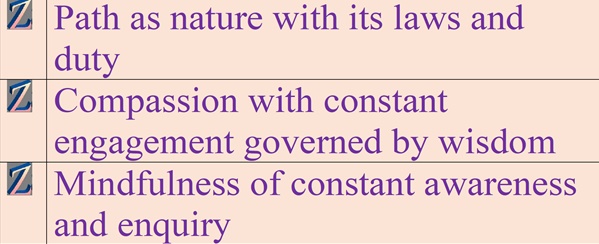Postscript for pathtivists

On this website there is a clear delineation, and this happened around the threshold of autonomy. One significant aspect for zandtao about this threshold is that the seeker has developed sufficient practice to cope with a journey into the unknown. To begin the work on the Prajna portal, zandtao gave the Diamond sutra warning. zandtao found this warning sutra connected with the Heart sutra but now considers it essential for all journeys taken into the unknown - hold to practice. On this website the practice was based on MwB, started in the Zandtaomed Trilogy - zandtaomed used to advise on this practice, and the practice goes through ongoing development - to be found here.
For zandtao himself he started to change from the MwB practice with his work on Viveka-Zandtao, and within this book concerning solitude zandtao started his journey into the unknown that led to the threshold of autonomy. From then on he held to practice, but this practice was improved by the love-wisdom balance that he learned with his work on the Prajna portal, but he has heeded the warning of the Diamond sutra to hold to practice.
In the Zandtaomed Trilogy, zandtaomed speaks of his MwB love-wisdom meditation practice together with the Seeker Story, and advises seekers to follow this. In the Manual he puts forward the notion of path activism – pathtivism asking seekers to follow their paths and embodying their paths in activism depending on what arises from the path; this is a fundamental difference to an activist who follows a cause or ideology first. And this fundamental difference is that for a pathtivist their actions are guided by the path of love and wisdom and not guided by conditioning (or the rejection thereof) that arises in causes and ideology. zandtao will look in detail at pathtivism in the book but began with  . .
Love is key for pathtivists. In a wisdom-focus there can be accommodations or compromises made by institutions, so that the institution can pursue the religion through wisdom only. Compromises with wisdom suit the patriarchy, patriarchy does not encourage love. Even in romantic love patriarchy creates patriarchal restrictions within families that limit romantic love. When religious institutions accept a wisdom-focus approach, this limiting of love can fundamentally be a compromise with patriarchy.
Love provides power. When we look at war and poverty with compassion, we see people dying because of patriarchy. Wisdom that we gain through our practices (often developed from religious institutional teachings) helps us to see the source of the war and poverty within the need for accumulation in the 1%-satrapy of patriarchy. Within the wisdom of such institutions is this understanding, but th and its love means that there must be sampajanna – harmonious activism based on embodiment of love and compassion; preservation of wisdom allows for compromise. compromise means that this wisdom doesn’t always act. For pathtivism and its autonomy there is no such institutional restriction. A pathtivist decides which community action to participate in based on their own love and wisdom. Without love, wisdom can remain isolated in institutions without an activist component. Up to the point of autonomy a seeker needs to develop a practice, without a practice exposure to conditioning will lead to errors. Once there is practice and the atammayata of autonomy, a seeker can begin harmonious activism. With pathtivism we see with clarity that patriarchy and conditioning are manipulating current activism so that it is not effective. The work of the pathtivist is to ensure that activism becomes effective by using their paths of love and wisdom to work with other activists on a sound strategy. Without the path where is such guidance? Without the path in the struggle we can observe that in totality it is going nowhere. Each conditioned generation rises out of their upbringing making demands as if they were the first. They close their minds to the wisdom of previous activists (even if those activists were not pathtivists they have still developed wisdom), and repeat the mistakes of previous generations. Activism needs to be based on love and wisdom, and not a rejection of conditioning. We need the love and wisdom of pathtivists to help us work together constructively. We need paths that put the love of people first and not demand of people that they conform to an ideology first. Wise love needs to be the guiding power of activism. As part of practice there is a release of the egos that divide the struggle, it is not ego and individualism that win the struggle but harmonious action that is based in love and community. Pathtivists work for the community not for their selves, egos and position. Putting the path first can build effective activism.
Checkout 
Companion Contents/Previous
|





